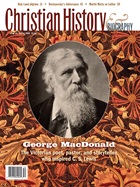All of the major Protestant reformers agreed that the Catholic Church had taken a wrong turn somewhere, but they disagreed about where the misstep occurred. Constantine's conversion, the codification of canon law, and the rise of scholastic theology received nominations, but as far as many Anglicans were concerned, the real trouble began in January 1077 at Canossa, a castle in Tuscany. —
Inside the castle, as freezing winds blew, Pope Gregory VII took refuge. Gregory never wanted to be pope, and he certainly never wanted to spend his waning years running around Europe, attempting to stay ahead of hostile princes. Unfortunately, his commitment to reform put him on a collision course with the secular powers of the day.
Outside the castle, Gregory's bitterest opponent, Holy Roman Emperor Henry IV, knelt in the snow. On this occasion Henry did not want Gregory's head, but his blessing. Dressed as a penitent, weeping, for three cold days, Henry got what he was after—but the peace between the two men could not last. The stakes of their epic battle, known as the Investiture Controversy, were simply too high.
In theory, the church has always held the power to appoint its own leaders. In medieval practice, however, secular authorities handed out clerical offices as patronage. Following the pattern known as investiture, abbots and bishops received their positions, and the properties that went with them, from local princes. The emperor picked the pope.
Gregory believed that the corruption and immorality of the 11th-century church stemmed from this practice. Before he could fight it at lower ecclesial levels, though, he had to free the papacy from imperial control. In 1059, when Gregory was still cardinal-subdeacon Hildebrand, he engineered the creation of the College of Cardinals as the body solely responsible for electing the pope. The new system did not take hold right away, but by 1073, when it was time to choose a successor for the deceased Alexander II, the cardinals spoke with one loud voice: "Let Hildebrand be pope!" The man who had put the cardinals in charge reluctantly accepted their mandate.
The empowerment of the College of Cardinals happened early in Henry's reign, when, as a 9-year-old boy, he occupied the throne recently vacated by his powerful and pious father. Hildebrand took advantage of Henry's minority, and the young German king resented him for it. Not long after Henry took charge of his own affairs, in 1070, he found an opportunity to strike back.
Royal rudeness
Soon after his election as pope, Gregory pressed his program of reform by forbidding investiture and threatening to excommunicate any layperson who dared to appoint clergy. Henry responded in 1076 by calling for Gregory's removal from office in a letter that ended, "I, Henry, king by the grace of God, with all of my Bishops, say to you, come down, come down, and be damned throughout the ages." Gregory, naturally, deposed and excommunicated Henry.
Neither combatant could enforce his order alone, and it turned out that Henry had considerably less support than he expected. His father, Henry III, had waged a largely successful campaign to consolidate imperial power for himself—at the expense of other German nobles, who were only too happy to see young Henry IV cut down. Faced with the prospect of aristocratic rebellion, Henry had no choice but to humble himself before the pope.
Gregory described the scene at Canossa in a letter to the German princes: "[W]e learned for certain that the king was approaching. He also, before entering Italy, sent on to us suppliant legates, offering in all things to render satisfaction to God, to St. Peter and to us. And he renewed his promise that, besides amending his life, he would observe all obedience if only he might merit to obtain from us the favor of absolution and the apostolic benediction.
"When, after long deferring this and holding frequent consultations, we had, through all the envoys who passed, severely taken him to task for his excesses, he came at length of his own accord, with a few followers, showing nothing of hostility or boldness, to the town of Canossa where we were tarrying. And there, having laid aside all the belongings of royalty, wretchedly, with bare feet and clad in wool, he continued for three days to stand before the gate of the castle. Nor did he desist from imploring with many tears the aid and consolation of the apostolic mercy until he had moved all of those who were present there."
The battle continues
Out of pastoral concern, Gregory lifted his excommunication of Henry, but he withheld his pledge of political fealty until Henry might prove himself worthy. Henry never passed that test. After Canossa, Henry continued to support clerics and nobles who opposed Gregory's reforms. Meanwhile, Henry's political enemies sought to press their apparent advantage.
Soon the empire descended into civil war. Pro-reform leaders in Germany elected their own king, Rudolf. Henry defeated Rudolf, stormed Rome, and elected his own pope, Clement III. Gregory excommunicated Henry a second time in 1080, imploring God to "exercise such swift judgment that all may know him to fall not by chance but by your power." Hedging his bets, Gregory also called upon his Norman allies in southern Italy. The Normans rescued Gregory, but they also sacked Rome, which did not please the locals. The Romans chased Gregory out of town, and he died in exile.
The Investiture Controversy continued for decades, and even after the 1122 Concordat of Worms formally ended investiture, popes and emperors crossed swords constantly. Recent events in England show that the debate continues in altered forms even today. The English monarch serves as supreme governor of the English church, in part to assure that the spectacle of Canossa is never repeated. With the divorced and remarried Prince Charles poised to wear the crown, though, some Anglican leaders believe the monarch's rule over the church should end. Surely Charles would never kneel in the snow outside Archbishop Rowan Williams's window … but the prince's confession at the blessing of his marriage came close.
Copyright © 2005 by the author or Christianity Today/Christian History & Biography magazine.
Click here for reprint information on Christian History & Biography.

Support Our Work
Subscribe to CT for less than $4.25/month





























